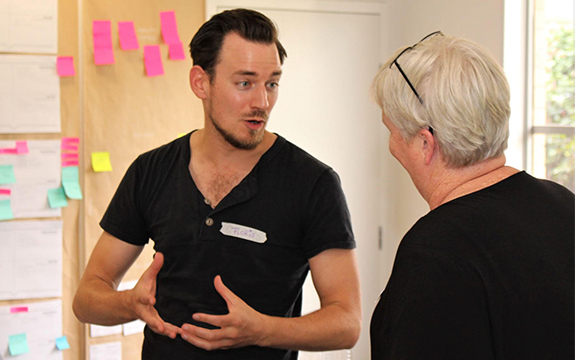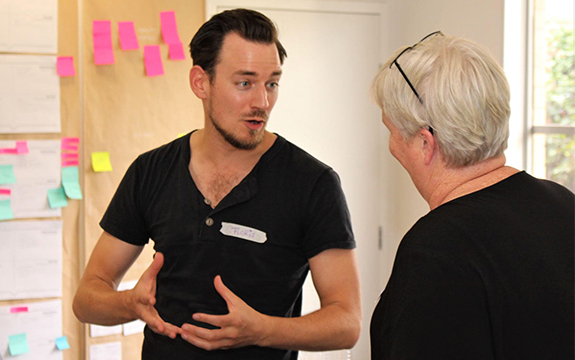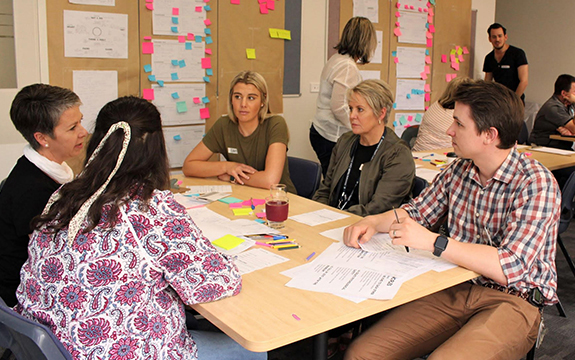Swinburne Design News
Swinburne and Aalto University Joint PhD

Belinda Stening Contributing Editor
11 March 2020
This article was originally published in Swinburne University of Technology’s Design News – a platform celebrating design and innovation across Swinburne’s School of Design. Discover the latest design news about Swinburne’s research, teaching and student success stories.
Established by Design Factory Melbourne (DFM) Director Prof Anita Kocsis at Swinburne, with Prof Tua Björklund from Aalto University, the Design Factory joint PhD program started last year.
The focus of the joint PhD in the Design Factory Global Network is to bring together students from different disciplines to research together in the design innovation space. Designer, Floris Van der Marel is the first joint PhD student and he’s paving the way for students entering the program.
Van der Marel started his first year at Swinburne in June 2019. He was admitted to the PhD Program at both Aalto and Swinburne, giving him access to the resources of both universities and the freedom to research in both locations.
Van der Marel at participatory design workshop with Wimmera Health Care
Photo: Peter Miller, Wimmera Health Care Group
“The joint PhD is different to regular PhD programs. Traditionally you spend the first year of a PhD doing courses and a literature review, then you start field work in your second year. I’m doing my first-year case study at Swinburne in Melbourne, my second-year case study in New York, and my third in Helsinki and presenting my findings in Helsinki,” says Van der Marel.
“This is the Design Factory way of research and study, where it’s better to fail fast, fail forward, keep iterating and keep learning rather than know what you want to do and stick only to that. I did a very quick literature review, some coursework and my first case study – immediately. After Swinburne, I do the same thing in the New York and Helsinki. It’s a very iterative approach, as opposed to the linear approach of PhD programs,” Van der Marel explains.
Van der Marel is researching Participatory Design Practice where different people come together to contribute to solve problems.
“I studied Industrial Design Engineering at Delft University of Technology and studied Design Interaction for my Masters Degree, looking at the experiences people have and how we can improve those experiences. After I graduated I worked in different countries and contexts with non-designers, to see how we can include everybody’s experience as part of the design process,” he says.
Participatory design workshop with Wimmera Health Care participants
Photo: Peter Miller, Wimmera Health Care Group
“This comes from understanding that to change things for the better, we need to have everybody represented in change initiatives. As designers we can’t do that for others. As much as designers like to think they can empathise, I don’t think that’s realistic. Designers don’t know everything!” he qualifies.
Based at Swinburne, Van der Marel is now collaborating with Wimmera Health Care Group, helping them manage an increase in patient-to-staff violence. Bringing together hospital staff, he’s unpacking what is causing the violence and how to respond to it. By creating an environment that is more friendly and open to expressing thoughts and ideas, he hopes unheard voices can be amplified.
“Hospital staffing structures are traditionally hierarchical and this works in emergency situations. Wimmera Health Care Group understands this, but they are also working to find ways of managing situations that allow everyone to contribute and listen to each other equally,” says Van der Marel.
Van der Marel leaves Swinburne and travels to New York later this year to continue his PhD. He has contributed to a book on Participatory Design Practice published by Aalto University, which talks about the role of design in large organisations.



